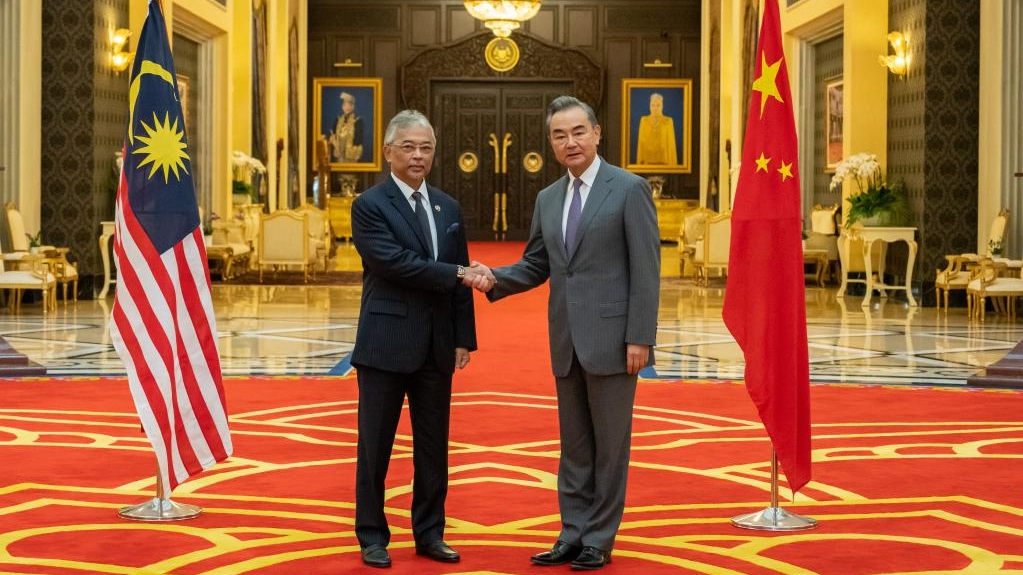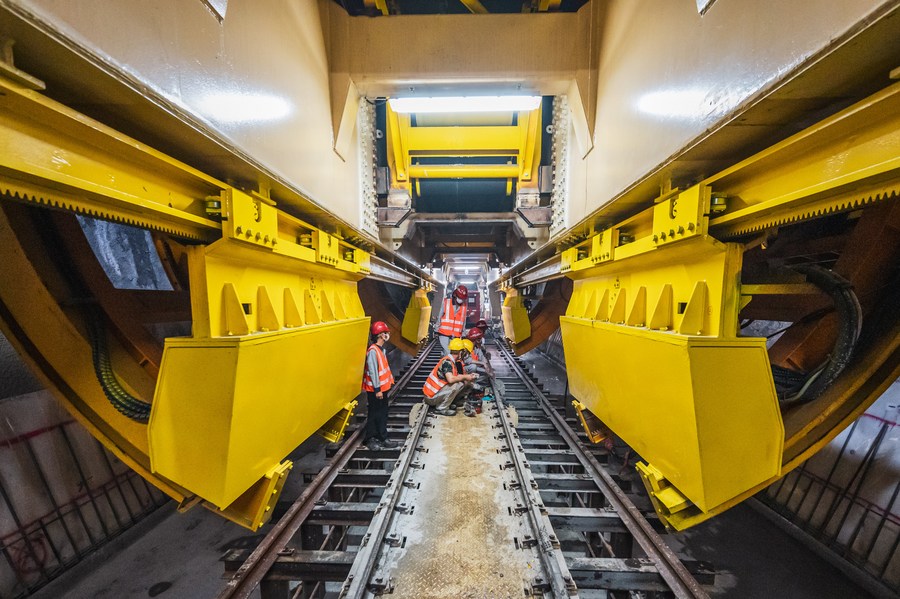
Malaysia's King Sultan Abdullah Sultan Ahmad Shah (L) meets with visiting Chinese State Councilor and Foreign Minister Wang Yi in Kuala Lumpur, Malaysia, July 12, 2022. [Photo/Xinhua]
By Hannan Hussain
On July 12, Malaysian King Sultan Abdullah Sultan Ahmad Shah met with Chinese State Councilor and Foreign Minister Wang Yi, agreeing to advance high-quality China-Malaysia cooperation under the Belt and Road Initiative (BRI).
"China is willing to work with Malaysia to strengthen the docking of development strategies, build the Belt and Road with high quality, expand and strengthen key projects, establish a pilot zone for production capacity cooperation and a pioneer zone for innovation, and help Malaysia give full play to its resources and advantageous location, and upgrade its industrialization," said Wang.
The mutual resolve to accelerate key Belt and Road projects could inject new impetus in the Malaysian economy. As an Economist report noted back in 2019, Malaysia stands out as an attractive destination for BRI projects, courtesy of its enabling investment environment. The added merits of its open foreign investment policies would explain Malaysia's broad-based success through BRI cooperation. The bilateral relationship has only strengthened, since and we see the rising demand for Chinese investment in the country.
All that can work to the advantage of their landmark industrial park projects, and to boost development of longstanding land connectivity infrastructure The Belt and Road's evolving role in the digital economy and green development space stands also in line with Malaysia's stated priority to advance its economy that can sustain "future growth." Accordingly, Wang's formal support for expanding China's investment and business footprint in Malaysia, is a move towards complimenting the near term priorities of its strategic partner.
The 10th anniversary of their comprehensive strategic partnership is also fast approaching. What better way than to lay more groundwork for advancing the East Coast Rail Link project, and its associated development? These measures merit greater attention because Malaysia forms a vital link in the pan-Asia railway network envisioned by China.

Technicians work on the massive Chinese-made tunnel boring machine (TBM) at the construction site of the Genting tunnel of the East Coast Rail Link near Bentong in Pahang state, Malaysia, April 29, 2022. [Photo/Xinhua]
Beijing's reception of Malaysia as a potential melting pot for Chinese enterprises and investment opportunities signals confidence for future BRI connectivity, and the desire to elevate ties to a whole new level. "Malaysia welcomes the initiative by China to promote openness, inclusiveness and mutual respect, and we support the concept in principle," said Foreign Minister Datuk Seri Saifuddin Abdullah.
From an economic performance viewpoint, key BRI projects have delivered substantial contributions to trade and investment between both countries. China has been Malaysia's leading trade partner for 13 years, accounting for nearly a fifth of the country's total trade last year.
Additionally, jointly inaugurated industrial park projects have played a significant role in enhancing the flow of future trade and investments between both countries, as well as attracting much higher levels of foreign direct investment into Malaysia. Thus, prioritizing these projects would boost Malaysia's industrial capacities to promote stronger Belt and Road cooperation, and synergize development strategies.
Interestingly, key development imperatives with a direct stake in BRI's regional integration also deserve timely completion. Among them lie the China-Malaysia blueprints for connectivity. These stand to benefit as both Kuala Lumpur and Beijing back expedited connectivity through the China-Laos-Thailand railways, and Beijing's commitment to advance communications on a strategic Singapore-Malaysia railway.
Note that investments in resilient infrastructure are imperative for Malaysia and the region at large. According to the Asian Development Bank (ADB), climate resilient infrastructure in Southeast Asia alone demands some $210 billion in annual investments till 2030. Thus, a desire to jointly step-up key BRI projects at this critical juncture is a testament to China and Malaysia's admirable foresight.
In sum, Wang's visit to Malaysia lays vital groundwork for future Belt and Road cooperation, increasing the likelihood of propelling Malaysia's economic development forward, and ensuring businesses gain from win-win cooperation.
Hannan Hussain is a foreign affairs commentator and author. He is a Fulbright recipient at the University of Maryland and a former assistant researcher at the Islamabad Policy Research Institute.

 中文
中文



